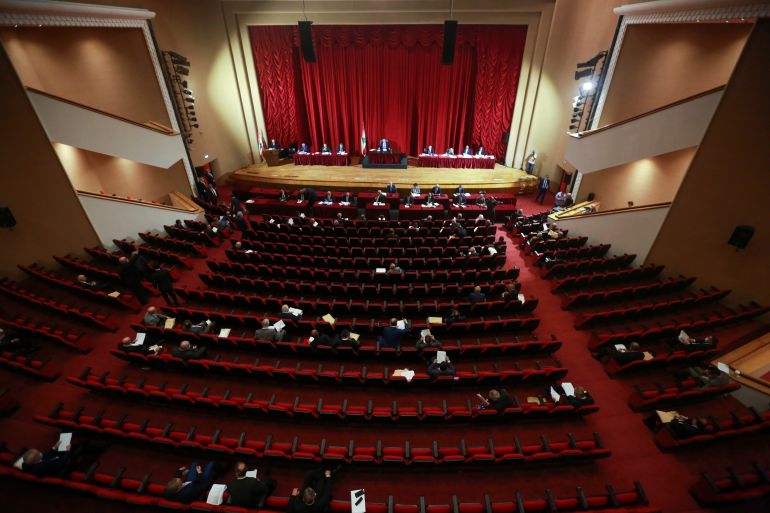Critics walk out as Lebanon parliament reaffirms March 2022 poll
MPs from President Michel Aoun’s party reiterate objections to early polls amid rising political tensions.

Beirut, Lebanon – The Lebanese parliament has again backed holding a parliamentary election in March next year, despite President Michel Aoun’s objections.
The vote on Thursday came some 10 days after MPs had voted in favour of amending the country’s 2017 electoral law to hold elections as early as March 27, rather than on May 8, and also decided against adding six additional seats to represent the large Lebanese diaspora.
Keep reading
list of 3 itemsLebanon sets March date for parliamentary election
Saudi Arabia, UAE summon Lebanon envoys over Yemen war criticism
Prime Minister Najib Mikati had supported holding the polls earlier than originally scheduled to avoid campaigning during the Muslim fasting month of Ramadan. But the Free Patriotic Movement (FPM), the largest Christian bloc headed by Aoun’s son-in-law Gebran Bassil, had opposed the move, citing stormy weather and the date coinciding with Lent, during which Christians fast.
Aoun also opposed the amendment and sent it back to parliament for reconsideration. In addition to reiterating the FPM’s comments, the president’s office said holding elections almost two months before schedule would pose logistical issues, shorten the timeframe for expats to register, and prevent young people who would reach the voting age of 21 by May 8 from taking part.
In Thursday’s session, the vote for the early elections was approved by 77 MPs. A separate vote about the six additional seats representing the diaspora also passed with the backing of 61 MPs. That was below the 65-vote threshold stipulated in the constitution but Speaker Nabih Berri let the vote through after deeming, based on attendance and current size of parliament (10 seats of MPs who have resigned or passed away have not been replaced), that 59 was the majority.
The FPM, who again voted against holding the polls early, then walked out in protest. In a statement later, Bassil argued that the number of votes for the diaspora seats vote did not constitute an absolute majority and that it was a constitutional violation.
“We are about to achieve holding parliamentary elections, so why do we insist on modifying the law that we unanimously voted for in 2017,” he also said. “And knowing that if we kept it as is, we would hold elections on time without facing any problems.”
Parliament was then adjourned, without addressing critical items on the agenda, including legislation related to capital controls and a World Bank loan to financially boost the country’s strained social assistance programme.
Amal Hamdan, an electoral systems and legal frameworks expert consultant, said that in addition to Aoun and the FPM’s reservations about holding elections early, there are other issues voters could face due to the economic crisis.
“Voters have to return to their places of origin to vote, and this is going to disenfranchise many Lebanese because of the dire economic situation – particularly youth and women,” Hamdan told Al Jazeera.
Hamdan also predicted that an apparent public lack of trust in the interior ministry holding fair elections would have an effect on turnout, regardless of the date.
“My biggest concern is that the interior ministry is going to continue to be in charge of these elections,” Hamdan said. “Because of the trust the Lebanese have towards the government, it is highly likely that a large number of Lebanese people will simply not vote, because they don’t trust that the interior ministry will hold elections with integrity.”
The election will be the first since the country’s popular uprising in late 2019, when hundreds of thousands of people began demanding an overhaul of the political and economic status quo.
It will take place against the backdrop of a spiralling economy, with three-quarters of the population plunged into poverty and locked out of their bank savings. The local currency has lost about 90 percent of its value.
Meanwhile, a continuing electricity crisis paralyses much of public life, while alarming food inflation has forced charities and United Nations agencies to increase food assistance for millions of people.
Lebanon’s parliament consists of 128 politicians, proportioned based on the country’s handful of religious and sectarian denominations. Parliament terms last four years, though the last polls in 2018 were held five years late.